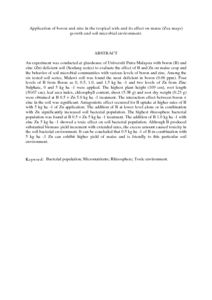Citation
Panhwar, Qurban Ali and Othman, Radziah and Yusop, Mohd Khanif and Naher, Umme Aminun
(2011)
Application of boron and zinc in the tropical soils and its effect on maize (Zea mays) growth and soil microbial environment.
Australian Journal of Crop Science, 5 (12).
pp. 1649-1654.
ISSN 1835-2693; ESSN:1835-2707
Abstract
An experiment was conducted at glasshouse of Universiti Putra Malaysia with boron (B) and zinc (Zn) deficient soil (Serdang series) to evaluate the effect of B and Zn on maize crop and the behavior of soil microbial communities with various levels of boron and zinc. Among the six tested soil series, Malawi soil was found the most deficient in boron (0.06 ppm). Four levels of B from Borax as 0, 0.5, 1.0, and 1.5 kg ha -1 and two levels of Zn from Zinc Sulphate, 0 and 5 kg ha -1 were applied. The highest plant height (109 cm), root length (30.67 cm), leaf area index, chlorophyll content, shoot (5.38 g) and root dry weight (0.23 g) were obtained at B 0.5 + Zn 5.0 kg ha -1 treatment. The interaction effect between boron × zinc in the soil was significant. Antagonistic effect occurred for B uptake at higher rates of B with 5 kg ha -1 of Zn application. The addition of B at lower level alone or in combination with Zn significantly increased soil bacterial population. The highest rhizosphere bacterial population was found at B 0.5 + Zn 5 kg ha -1 treatment. The addition of B 1.0 kg ha -1 with zinc Zn 5 kg ha -1 showed a toxic effect on soil bacterial population. Although B produced substantial biomass yield increment with extended rates, the excess amount caused toxicity in the soil bacterial environment. It can be concluded that 0.5 kg ha -1 of B in combination with 5 kg ha -1 Zn can exhibit higher yield of maize and is friendly to this particular soil environment.
Download File
![[img]](http://psasir.upm.edu.my/23731/1.hassmallThumbnailVersion/Application%20of%20boron%20and%20zinc%20in%20the%20tropical%20soils%20and%20its%20effect%20on%20maize.pdf)  Preview |
|
PDF (Abstract)
Application of boron and zinc in the tropical soils and its effect on maize.pdf
Download (84kB)
| Preview
|
|
Additional Metadata
Actions (login required)
 |
View Item |

